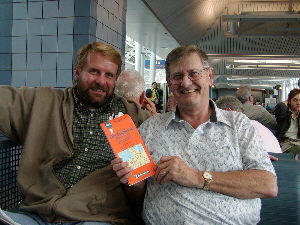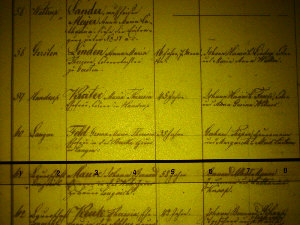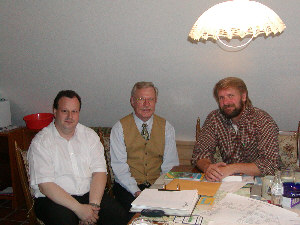A Travelreport from our adventure in Wettrup Lower Saxony
Author: Steve Feld; Chandler; Arizona; USA
Dad and I traveled to Deutschland with a little knowledge of the German language from our studies. Both of us are analysts and have somewhat extensively sought to better understand how the language communicates your thoughts, compared to our American english. Perhaps I, better than my Dad, have learned from my instruction to accept what is ("Gibt es" doesn't mean "Gives it" exactly) and to save the analysis for when I am fluent. We enjoyed being "auslanders" in Deutschland because we are normally only Americans like 300,000,000 others here. Our adventure to return to the family homeland began immediately once we boarded the Lufthansa flight from Chicago to Munich on the 14th of May. We both practiced our German with the flight attendants and asked that the flight crew sign their names on the reverse side of our "Family Researchers" business cards for our first souvenir. We marveled at the peculiarities of traveling so fast against the rotation of the Earth--such as: the sun rising at 11:30pm Chicago time, and the outside temperature of -56 degrees centigrade.
extensively sought to better understand how the language communicates your thoughts, compared to our American english. Perhaps I, better than my Dad, have learned from my instruction to accept what is ("Gibt es" doesn't mean "Gives it" exactly) and to save the analysis for when I am fluent. We enjoyed being "auslanders" in Deutschland because we are normally only Americans like 300,000,000 others here. Our adventure to return to the family homeland began immediately once we boarded the Lufthansa flight from Chicago to Munich on the 14th of May. We both practiced our German with the flight attendants and asked that the flight crew sign their names on the reverse side of our "Family Researchers" business cards for our first souvenir. We marveled at the peculiarities of traveling so fast against the rotation of the Earth--such as: the sun rising at 11:30pm Chicago time, and the outside temperature of -56 degrees centigrade.
Four hours after officially arriving in Germany, we finally met Herr Schlump, after eighteen months of corresponding via internet e-mail and occasionally regular postal service. Twelve years ago my uncle Dutch corresponded with the church diocese in Osnabrueck to learn more about Johann Clemens Feld, one of our 19th century ancestors who's decision to leave Germany in 1858 made us American. Representatives from the diocese noted that great-great Grandpa Feld came from Wettrup. From this information I located Wettrup on the map, found that this fellow Schlump had a website and contacted him for more (and more--ha ha) information.
 I was very happy to finally meet the real man who had become a very good friend on the internet and to meet his family in the first hours of our "return" to Germany. Dad and I agreed that we were very fortunate to have such decent, generous hosts and new friends as them. In our first week in Wettrup many of our misconceptions about life there were dispelled.
I was very happy to finally meet the real man who had become a very good friend on the internet and to meet his family in the first hours of our "return" to Germany. Dad and I agreed that we were very fortunate to have such decent, generous hosts and new friends as them. In our first week in Wettrup many of our misconceptions about life there were dispelled.
Though Wettrup is officially 1110 years old, the village appears to be "brand new" because of the care the village people give its fields, canals, streets, buildings and cemetery. We learned that your oldest boundary marker is from 1651 (?), your oldest building is from 1793 (?) and that the earliest gravestones typically date from about 1955, with some acception for the gravesites of honored parish priests and nuns. I had wondered how Germany dealt with maintaining ancient gravesites and now we know.
By your help we were able to examine actual church records in person (in Wettrup) and by microfiche in Meppen to locate our family history back to the 1790s. On May 17 my Dad located records showing that Herzlake was the hometown of his surname great, great-grandfather (Bernard Heinrich Feld) and five minutes later I located the hometown of my great, great-grandfather (Johannes Clemens Feld, Bernard's son) as Langen. We examined records which gave us specific dates of marriages, births and deaths of many known and unknown Heuer, Schoenhoff, Wielage, and Luegering (umlauts where oe and ue appear here Juergen) ancestors and siblings of those ancestors who once lived in Herzlake, Langen, Gersten and Broegbern. We have also a very basic understanding of the 19th century relationships of the Feld family in the former Kingdom of Hannover to include extended relationships within Wettrup and perhaps now some of the present residents there.
specific dates of marriages, births and deaths of many known and unknown Heuer, Schoenhoff, Wielage, and Luegering (umlauts where oe and ue appear here Juergen) ancestors and siblings of those ancestors who once lived in Herzlake, Langen, Gersten and Broegbern. We have also a very basic understanding of the 19th century relationships of the Feld family in the former Kingdom of Hannover to include extended relationships within Wettrup and perhaps now some of the present residents there.
Thanks to Herr Achim Meintgens, a new fifth cousin, we were able to examine actual church books in Muenster from the early 1600s to 1890s. My father was profoundly impressed and humbled with holding the books within which church scribes accounted for the special spiritual events in the lives of his mother's ancestral families so long ago.
But why do we do this? We Americans prefer an unusual challenge. This information exists and we can learn much from it, if we only dare to explore. We have once and for all bridged two continents on which our families have lived--we have seen documents on both sides of the Atlantic Ocean to prove where our families came from in Germany.
 That we are of German descent we always knew--but wohin, irgendwo..and now we know. Some of the earlier mystique is gone, but now we may ask more questions from our new position of reliable knowledge--thanks to you. We know good people 5,000-6,500 miles away, we have been invited into their homes for good, very good meals and have talked with them. We have tried to communicate in your language and have laughed with you all there. We have seen your good ideas put to great practical use---some things we have never before seen--even in this great country of ours. We have much to learn from the German people and you have much in your way of life to be profoundly proud of. This goodness you must protect. We are proud to be of German descent.
That we are of German descent we always knew--but wohin, irgendwo..and now we know. Some of the earlier mystique is gone, but now we may ask more questions from our new position of reliable knowledge--thanks to you. We know good people 5,000-6,500 miles away, we have been invited into their homes for good, very good meals and have talked with them. We have tried to communicate in your language and have laughed with you all there. We have seen your good ideas put to great practical use---some things we have never before seen--even in this great country of ours. We have much to learn from the German people and you have much in your way of life to be profoundly proud of. This goodness you must protect. We are proud to be of German descent.
danke unsere Freunde
S T E V E
